
Augustus Radcliffe Grote was a British entomologist who described over 1,000 species of butterflies and moths. He is best known for his work on North American Noctuidae. A number of species were named after him, including the moth Horama grotei.

Pyrausta is a speciose genus of moths of the family Crambidae. The genus was erected by Franz von Paula Schrank in 1802.
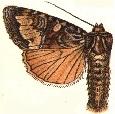
Apamea occidens, the western apamea, is a moth of the family Noctuidae. The species was first described by Augustus Radcliffe Grote in 1878. It is native to western North America as far east as Alberta and Kansas.

Schinia nuchalis, the spotted sage moth, is a moth of the family Noctuidae. The species was first described by Augustus Radcliffe Grote in 1878. It is found from the Great Plains and Great Basin, from southern Saskatchewan, Alberta and British Columbia south to northern Arizona. The Eurasian Schinia scutosa is no longer considered a synonym of Schinia nuchalis.
Coenophila opacifrons, the blueberry dart or plain-faced blueberry dart, is a moth of the family Noctuidae. The species was first described by Augustus Radcliffe Grote in 1878. It is found in North America from Labrador and Newfoundland, south to New Jersey, west across the boreal forest to eastern British Columbia, south in the mountains to southern Montana.
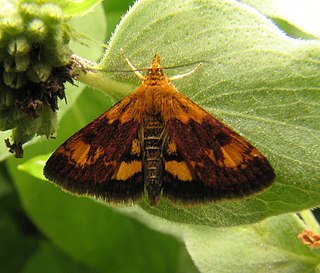
Pyrausta orphisalis, the orange mint moth or orange-spotted pyrausta, is a species of moth of the family Crambidae. It was described by Francis Walker in 1859. It is found in North America from Newfoundland west to British Columbia, south to Florida and New Mexico.
Loxostege anartalis is a moth in the family Crambidae. It was described by Augustus Radcliffe Grote in 1878. It is found in North America, where it has been recorded from coast to coast in Canada. In the west, the range extends south to California.
Pyrausta atropurpuralis is a moth in the family Crambidae. It was described by Augustus Radcliffe Grote in 1877. It is found in North America, where it has been recorded from Texas, New Mexico and Colorado.
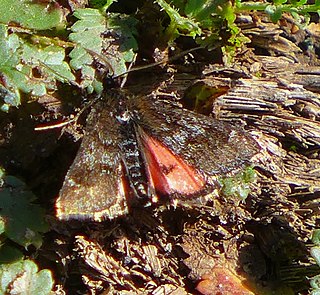
Pyrausta dapalis is a moth in the family Crambidae. It was described by Augustus Radcliffe Grote in 1881. It is found in western North America, where it has been recorded from California and Oregon.

Pyrausta flavofascialis is a moth in the family Crambidae. It was described by Augustus Radcliffe Grote in 1882. It is found in North America, where it has been recorded from western Texas to Arizona. It is also found in Mexico.

Pyrausta generosa is a moth in the family Crambidae. It was described by Augustus Radcliffe Grote and Coleman Townsend Robinson in 1867. It is found in North America, where it has been recorded from Ontario to Alberta and to Florida and Missouri. The habitat consists of undisturbed areas in aspen parkland and mixed woods.

Pyrausta lethalis, the lethal pyrausta moth, is a moth in the family Crambidae. It was described by Augustus Radcliffe Grote in 1881. It is found in North America, where it has been recorded from California to southern Nevada, southern Arizona and Texas.
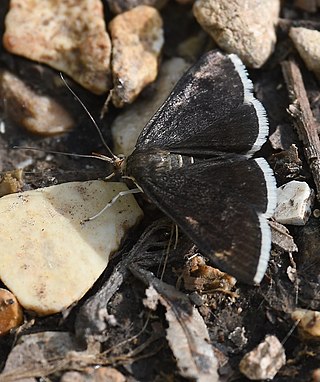
Pyrausta niveicilialis, the white-fringed pyrausta moth, is a moth in the family Crambidae. It was described by Augustus Radcliffe Grote in 1875. It is found in North America, where it has been recorded from southern Canada to Florida and west to Colorado.
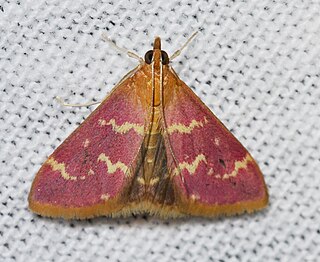
Pyrausta signatalis, the raspberry pyrausta moth, is a moth in the family Crambidae. It was described by Francis Walker in 1866.
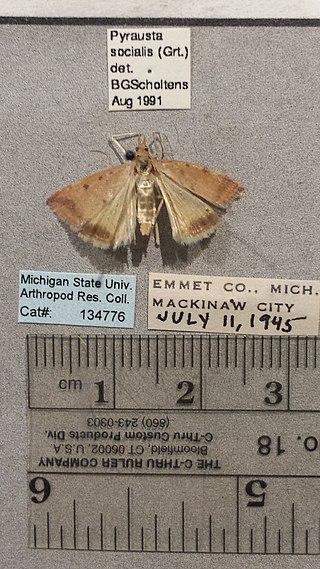
Pyrausta socialis, the sociable pyrausta moth, is a moth in the family Crambidae. It was described by Augustus Radcliffe Grote in 1877. It is found in North America, where it has been recorded from Ontario west to British Columbia, south to Montana and Colorado.

Pyrausta subsequalis, also known as the weedfield sable, is a moth in the family Crambidae. It was described by Achille Guenée in 1854. It is found in much of North America, where it has been recorded from southern Alberta and southern British Columbia south to Arizona and New Mexico and east to Florida and north to Ontario. The habitat consists of dry prairie areas.
Pyrausta tatalis is a moth in the family Crambidae. It was described by Augustus Radcliffe Grote in 1877. It is found in North America, where it has been recorded from California to Texas and Oklahoma.

Pyrausta unifascialis, the one-banded pyrausta, is a moth in the family Crambidae. It was described by Alpheus Spring Packard in 1873. It is found in North America, where it has been recorded from Quebec west to British Columbia, south to Arizona and California. The habitat consists of forest openings, clearings and fields.
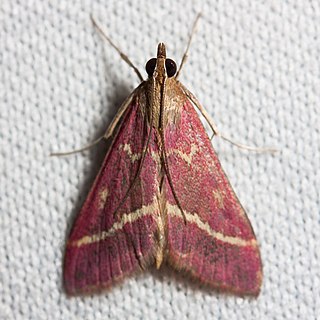
Pyrausta volupialis, the volupial pyrausta moth, is a moth in the family Crambidae. It was described by Augustus Radcliffe Grote in 1877. It is found in North America, where it has been recorded from Oklahoma, Utah, Texas, Colorado, New Mexico, Arizona and California to Chiapas, Mexico.
Pyrausta borealis, the northern pyrausta moth, is a moth in the family Crambidae. It was described by Alpheus Spring Packard in 1867. It is found in North America, where it has been recorded from Newfoundland and Labrador west to British Columbia, north to Alaska and the Yukon. The habitat consists of boreal forests.














